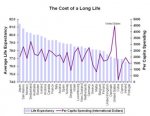- Joined
- Jul 19, 2012
- Messages
- 14,185
- Reaction score
- 8,768
- Location
- Houston
- Gender
- Male
- Political Leaning
- Libertarian
All of the insurance companies operating in North Carolina except one, Blue Cross/Blue Shield, have dropped out of the Obamacare exchange. And that one company will be increasing its premiums by 25% for 2017. This pushes premiums up to near the $2000 a month level for a family making it the greatest expense for many families not eligible for a subsidy, bigger than the mortgage or the car payment, close to 50% of take home pay for the average family income. And if people decide they can't afford this then they must pay the penalty mandated by law in addition to going without medical insurance.
Many people would under these circumstances opt for a catastrophic health policy, but that's not allowed by the law, which mandates that everyone buy a full policy with all the bells and whistles.
Because insurance companies can't turn down people with pre-existing conditions and healthy people find the premiums less and less affordable the pool of insured is increasingly dominated by sicker people, so that pool of insured costs more on the average. Without government subsidies to insurance companies (and the courts struck down the authority of the Obama administration to hand out those subsidies) premiums cost more and more.
If only someone had warned us that it would turn out like this. Oh, wait ... we DID. We DID warn you. We told you and we told you, and you wouldn't listen. The ACA was passed with NO Republican support. The Republicans said they didn't like it, they didn't want it, they would not support it or fix it. And the ACA was passed by the Democrats anyway because they didn't think they needed any Republican support. They thought they'd be in the majority for 40 years! Yes! They thought that once people saw how great Obamacare is then it would be the end of the Republicans forever! But suffice it to say that the Republicans are not gone, and they haven't changed their minds about the ACA.
Were it left to me I think I'd go with a plan to for catastrophic health insurance, not necessarily through the government, and get rid of the idea of health insurance as something that pays for every little medical expense. You don't rely on car insurance to pay for oil changes. You don't rely on home owner's insurance to pay for house painting. Insurance generally is something used to keep us from falling apart in the case of some disaster. Health insurance should be the same way.
Many people would under these circumstances opt for a catastrophic health policy, but that's not allowed by the law, which mandates that everyone buy a full policy with all the bells and whistles.
Because insurance companies can't turn down people with pre-existing conditions and healthy people find the premiums less and less affordable the pool of insured is increasingly dominated by sicker people, so that pool of insured costs more on the average. Without government subsidies to insurance companies (and the courts struck down the authority of the Obama administration to hand out those subsidies) premiums cost more and more.
If only someone had warned us that it would turn out like this. Oh, wait ... we DID. We DID warn you. We told you and we told you, and you wouldn't listen. The ACA was passed with NO Republican support. The Republicans said they didn't like it, they didn't want it, they would not support it or fix it. And the ACA was passed by the Democrats anyway because they didn't think they needed any Republican support. They thought they'd be in the majority for 40 years! Yes! They thought that once people saw how great Obamacare is then it would be the end of the Republicans forever! But suffice it to say that the Republicans are not gone, and they haven't changed their minds about the ACA.
Were it left to me I think I'd go with a plan to for catastrophic health insurance, not necessarily through the government, and get rid of the idea of health insurance as something that pays for every little medical expense. You don't rely on car insurance to pay for oil changes. You don't rely on home owner's insurance to pay for house painting. Insurance generally is something used to keep us from falling apart in the case of some disaster. Health insurance should be the same way.
Last edited:

